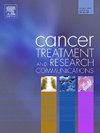晚期卵巢癌患者术后化疗对血糖及预后的影响
IF 2.4
Q3 Medicine
引用次数: 0
摘要
目的近期研究表明,化疗可引起肿瘤患者糖代谢异常;然而,我们对卵巢癌患者的血糖(BG)与化疗的关系知之甚少。本研究探讨化疗对晚期卵巢癌患者糖代谢的影响及其对患者预后的影响。方法回顾性分析100例晚期卵巢癌(International Federation of Gynecology and Obstetrics, FIGO III/IV)患者化疗前后血糖等临床资料。Kaplan-Meier生存曲线用于计算BG-High组和BG-Low组患者的OS(总生存率)生存曲线,并使用对数秩统计(Mantel-Cox)来评估患者临床结局与相关指标之间的相关性。结果本研究纳入的100例晚期卵巢癌(OC)患者中,49例(49%)根据FIGO分级为III期,51例为IV期。在完成手术切除或满意的细胞减少手术后,每3周进行紫杉醇-卡铂化疗,共6个周期,总共65例(65%)患者实现了R0手术切除,35例(35%)患者实现了R1。根据化疗后血糖(BG)水平将患者分为血糖≥6.1mmol/L (BG高)和血糖<两组;6.1mmol/L (BG低)。32例(BG高)患者化疗后空腹血糖升高。其中6例明确诊断为糖尿病,空腹BG≥7.0 mmol/L, 26例空腹血糖受损,空腹BG 6.1-6.9 mmol/L;这一差异具有统计学意义(P <;0.05)。Kaplan-Meier分析显示,本研究中100例OC患者的平均5年OS(从诊断到治疗后5年的生存概率)为33个月。BG-LOW组患者的平均生存期为37个月,而BG-High组为28个月;差异有统计学意义(P <0.01)。Cox回归模型显示化疗后血糖水平对OC患者的OS有独立影响(危险比[HR]: 3.4;95%置信区间[CI]: 2.0-5.7;P & lt;0.01)。此外,FIGO分期和手术R0切除对患者生存也有独立的影响。结论晚期卵巢癌患者在辅助化疗期间出现高血糖。此外,化疗后血糖升高与预后不良有关。我们的发现确定了潜在的化疗风险,并强调了预防高血糖的重要性。本文章由计算机程序翻译,如有差异,请以英文原文为准。
The effect of postoperative chemotherapy on blood glucose and prognosis in patients with advanced ovarian cancer
Objective
Recent studies have shown that chemotherapy can cause abnormal glucose metabolism in cancer patients; however, little is known about the association of blood glucose (BG) with chemotherapy in ovarian cancer. In this study, we investigated the effect of chemotherapy on glucose metabolism in patients with advanced ovarian cancer and its effect on patient prognosis.
Methods
We retrospectively analyzed blood glucose and other clinical data from 100 patients with advanced ovarian cancer (International Federation of Gynecology and Obstetrics, FIGO III/IV) before and after chemotherapy. Kaplan-Meier survival curves were used to calculate OS Overall Survival) survival curves for patients in the BG-High and BG-Low groups, and logarithmic rank statistics (Mantel-Cox) to assess associations between clinical outcomes and related indicators of patients.
Results
Of the 100 patients with advanced ovarian cancer (OC) included in this study, 49 patients (49 %) had stage III disease, and 51 had stage IV disease according to FIGO classification. In total, 65 patients (65 %) achieved R0 surgical resection, while 35 patients (35 %) achieved R1, after complete surgical resection or satisfactory cytoreductive surgery followed by paclitaxel-carboplatin chemotherapy every three weeks for a total of six cycles. According to blood glucose (BG) levels after chemotherapy, patients were divided into two groups: blood glucose ≥ 6.1mmol/L (BG High) and blood glucose < 6.1mmol/L (BG Low). Thirty-two patients (BG High) had elevated fasting blood glucose levels after chemotherapy. Of these, six patients were definitively diagnosed with diabetes, fasting BG ≥7.0 mmol/L, and 26 patients had impaired fasting blood glucose, fasting BG 6.1–6.9 mmol/L; this difference was statistically significant (P < 0.05). Kaplan-Meier analysis showed that the mean 5-year OS (probability of survival from diagnosis to 5 years post-treatment) of 100 patients with OC in this study were 33 months. The mean OS of patients in the BG-LOW group was 37 months compared to 28 months in the BG-High group; this difference was statistically significant (P <0.01). The Cox regression model indicated that post-chemotherapy blood glucose levels exerted an independent effect on OS in OC patients (hazard ratio [HR]: 3.4; 95 % confidence interval [CI]: 2.0–5.7; P < 0.01). In addition, FIGO staging and surgical R0 resection also exerted independent effects on patient survival.
Conclusion
Patients with advanced ovarian cancer experience hyperglycemia during adjuvant chemotherapy. Furthermore, an increase in blood glucose after chemotherapy is associated with a poor prognosis. Our findings identified potential chemotherapy risks and highlighted the importance of preventing hyperglycemia.
求助全文
通过发布文献求助,成功后即可免费获取论文全文。
去求助
来源期刊

Cancer treatment and research communications
Medicine-Oncology
CiteScore
4.30
自引率
0.00%
发文量
148
审稿时长
56 days
期刊介绍:
Cancer Treatment and Research Communications is an international peer-reviewed publication dedicated to providing comprehensive basic, translational, and clinical oncology research. The journal is devoted to articles on detection, diagnosis, prevention, policy, and treatment of cancer and provides a global forum for the nurturing and development of future generations of oncology scientists. Cancer Treatment and Research Communications publishes comprehensive reviews and original studies describing various aspects of basic through clinical research of all tumor types. The journal also accepts clinical studies in oncology, with an emphasis on prospective early phase clinical trials. Specific areas of interest include basic, translational, and clinical research and mechanistic approaches; cancer biology; molecular carcinogenesis; genetics and genomics; stem cell and developmental biology; immunology; molecular and cellular oncology; systems biology; drug sensitivity and resistance; gene and antisense therapy; pathology, markers, and prognostic indicators; chemoprevention strategies; multimodality therapy; cancer policy; and integration of various approaches. Our mission is to be the premier source of relevant information through promoting excellence in research and facilitating the timely translation of that science to health care and clinical practice.
 求助内容:
求助内容: 应助结果提醒方式:
应助结果提醒方式:


